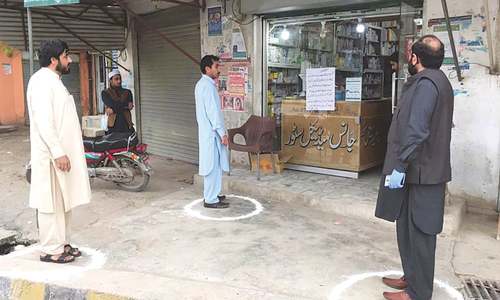LAHORE: With 10 cases of local transmission of the Covid-19, Punjab witnessed another bad day on Wednesday when 47 more suspected patients tested positive for the virus across the province, including 18 in Lahore.
In a related development, Chief Minister Usman Buzdar has given approval for purchase of 60,000 real-time PCR kits that will be enough to conduct tests of 3.6 million patients for coronavirus, besides establishment of eight new biological safety Level-III labs for the virus diagnosis.
With detection of the fresh cases, the total number of patients who tested positive for the virus jumped to 312 in Punjab, including 176 in DG Khan, 77 in Lahore, 21 in Gujrat and 19 in Jehlum, says a spokesperson for the health department.
After surfacing of the first confirmed Covid-19 in Narowal on Wednesday, the coronavirus has so far spread to 12 cities of Punjab.
CM approves eight bio-safety labs for early diagnosis
According to the official figures, eight cases have been reported in Gujranwala, three cases in Multan, two each in Rawalpindi and Faisalabad, and one each in Sargodha, Mandi Behauddin and Rahim Yar Khan.
The worrying part of this development is that the patients having no international travel history are testing positive for Covid-19 in the province.
An official told Dawn that so far 10 patients tested positive after they contracted virus from an infected person. Of them, three are from Lahore.
Meanwhile, he said, the primary & secondary healthcare department had also started the process for establishment of eight more biological safety labs for the virus diagnosis. Of these, two labs will be established in Lahore and one each in Faisalabad, Wazirabad, DG Khan, Multan, Rawalpindi and Bahawalpur.
Similarly, he said the department was also purchasing eight more PCR machines for which the process had been initiated.
The official said the Punjab health department was improving its stocks position through procurement of new medical equipment following reports about the expected surge in Covid-19 cases in the coming days or weeks.
He said the authorities feared that the local transmission of the virus might multiply the cases.
Meanwhile, the Corona Experts Advisory Group (CEAG) held its second consecutive meeting here on Wednesday, recommending a new policy of ‘One attendant, one patient’ for the state-run teaching hospitals in Punjab. The policy will be implemented at the OPDs and emergency and indoor wards of both public and private hospitals in Punjab.
The specialized healthcare & medical education department also notified instructions for the heads of all the medical institutions, asking them to ensure implementation of the policy in letter and spirit.
Published in Dawn, March 26th, 2020














































